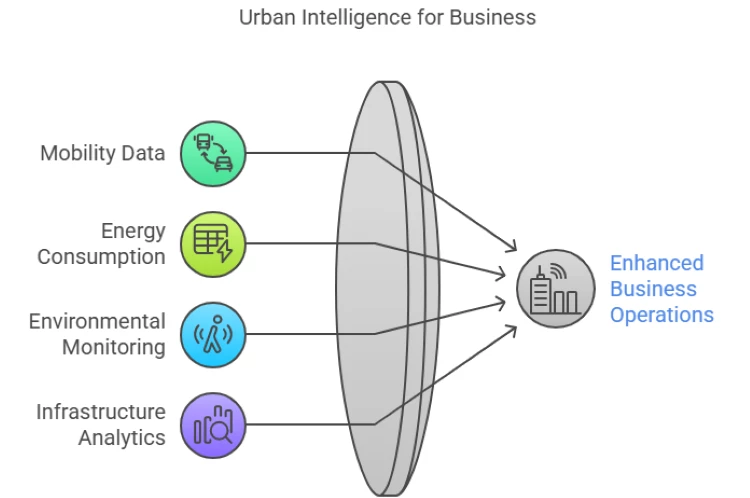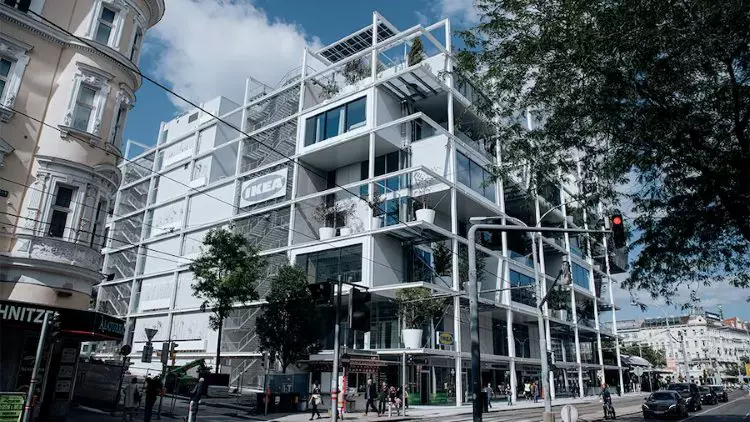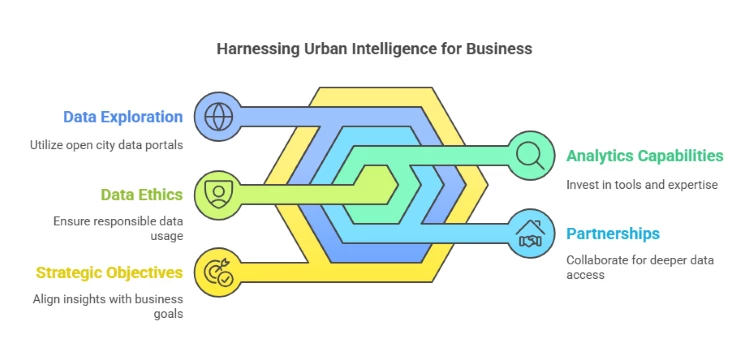Imagine walking through a smart city where every traffic light, bike lane, and metro car quietly generates data — data that could reshape how businesses make decisions. Welcome to the world of urban intelligence for business, where the smartest companies aren’t just adapting to city life. They’re thriving because of it.
In today’s era of rapid urbanization and digital transformation, cities are no longer just physical spaces. They are living, breathing ecosystems powered by real-time information flows. For forward-thinking businesses, this evolution opens a new frontier: urban intelligence for business. Companies that learn to tap into city data can optimize operations, reduce risks, unlock growth opportunities, and stay resilient in increasingly dense, dynamic environments.
Why urban intelligence for business is a game-changer
Urban intelligence refers to the use and real-time analysis of data generated by cities — from traffic patterns to air quality, energy use, and citizen behavior. Thanks to the rapid deployment of IoT devices, sensor networks, and digital infrastructure, modern cities are becoming data goldmines not just for municipal managers, but for businesses eager to gain an edge.
And the numbers back it up: urban data volume is projected to grow by over 140% between 2023 and 2027, driven by a 17.9% annual increase in IoT connections — expected to exceed 122 million active devices by 2027.
Picture this:
- A retail chain that dynamically adjusts inventory based on real-time pedestrian flows.
- A logistics company rerouting deliveries instantly based on traffic and environmental data.
- A real estate developer using noise and mobility heatmaps to optimize property values.
Urban intelligence enables businesses to become faster, smarter, and much more adaptable in competitive city environments.
What smart cities offer: from sensors to business solutions
Smart cities integrate technology into everyday life, creating digital platforms that not only improve public services but also generate actionable insights for the private sector. These data streams include:
- Mobility data from connected public transit, bike-sharing, and ride-hailing apps.
- Energy consumption patterns captured by smart grids and smart meters.
- Environmental monitoring via sensors tracking air quality, noise, and temperature.
- Infrastructure analytics covering waste collection, water systems, and street lighting.

Cities like Singapore, Helsinki, and Amsterdam are global leaders in providing open urban data portals that businesses can access to power new solutions.
And businesses are paying attention:70% of executives report that access to open government data is essential for their operations.
How businesses are using smart city data
Logistics: UPS in smart cities.
UPS (United Parcel Service) has partnered with cities like London and Hamburg to optimize delivery routes using urban sensor data, resulting in reduced fuel consumption, faster delivery times, and lower carbon emissions.
Retail: smarter store locations.
Major brands use pedestrian flow and demographic heatmaps to decide where to open new stores or adjust staffing levels dynamically. For instance, real-time foot traffic data helps retailers fine-tune operating hours for maximum profitability.
Real estate: data-driven development.
Developers increasingly rely on urban intelligence — analyzing population density, transit proximity, and even noise levels — to assess property values and design more adaptive spaces aligned with future trends.
Urban mobility: e-scooters and ride-sharing.
Companies like Lime and Uber heavily depend on city datasets to manage fleet distribution, dynamic pricing strategies, and integration with public transportation for seamless multi-modal travel options.
Moreover, data-driven infrastructure can directly boost local economies. For example a recent study found that Citi Bike stations and LinkNYC kiosks in New York increased nearby commercial activity by 12–15%, particularly in food and retail sectors.
Smart business in action: success stories
Simens mobility and Singapore.
Partnering with the Singapore Land Transport Authority, Siemens deployed , the digital Rail Enterprise Asset Management System (REAMS) , using predictive analytics to reduce metro system breakdowns by 30%. This not only boosted efficiency for the city but also showcased Siemens’ cutting-edge mobility solutions to global markets.
Starbucks in NewYork City.
By combining municipal open data with internal analytics, Starbucks identified high-potential locations based on pedestrian traffic, public transport proximity, and neighborhood demographics. As a result, newly opened stores saw a 20% higher footfall compared to traditional selection methods.
IKEA’s urban innovation in Vienna
IKEA’s city-center store in Vienna was designed around public transport access, pedestrian density, and carbon footprint data. The vertical, car-free format — with rooftop photovoltaics and a public terrace — not only aligned with Vienna’s sustainable goals but also boosted foot traffic by 25% in its first six months.

ENGIE’s smart grids in Paris
Energy giant ENGIE partnered with the City of Paris to build smart grids that optimize electricity distribution based on real-time demand. This not only lowered energy costs for participating businesses but also helped meet Paris’ carbon reduction targets — offering firms a strong ESG performance boost.
How it is possible to harness urban intelligence for business: A practical guide
Urban intelligence isn’t just for tech giants. Every business can start tapping into city data today. Here’s how:
- Define strategic objectives: Identify how urban insights (mobility, energy, behavior patterns) align with your business goals.
- Explore open city data portals: Many cities (e.g., New York, Amsterdam) offer free, real-time data.
- Forge partnerships: Collaborate with municipalities or civic tech startups for deeper data access.
- Build analytics capabilities: Invest in tools and expertise to turn raw city data into actionable intelligence.
- Commit to data ethics: Prioritize responsible data usage, ensuring privacy and transparency, especially for consumer-facing solutions.

Urban intelligence isn’t just about collecting data. It’s about asking the right questions and finding smarter answers.
Looking ahead: smarter cities, stronger businesses
As cities digitize faster and urban life becomes more interconnected, the businesses that thrive will be those who embrace this data-driven reality. Urban intelligence is not a trend for the future. It’s a competitive resource today.
Forward-thinking companies that engage with smart city systems and invest in urban data strategies will lead the charge toward more sustainable, resilient, and profitable urban economies. In the city of tomorrow, the smartest businesses won’t just survive. They’ll shape the very environment they operate in.
You can read more about profiting from renewable energy in cities here.


